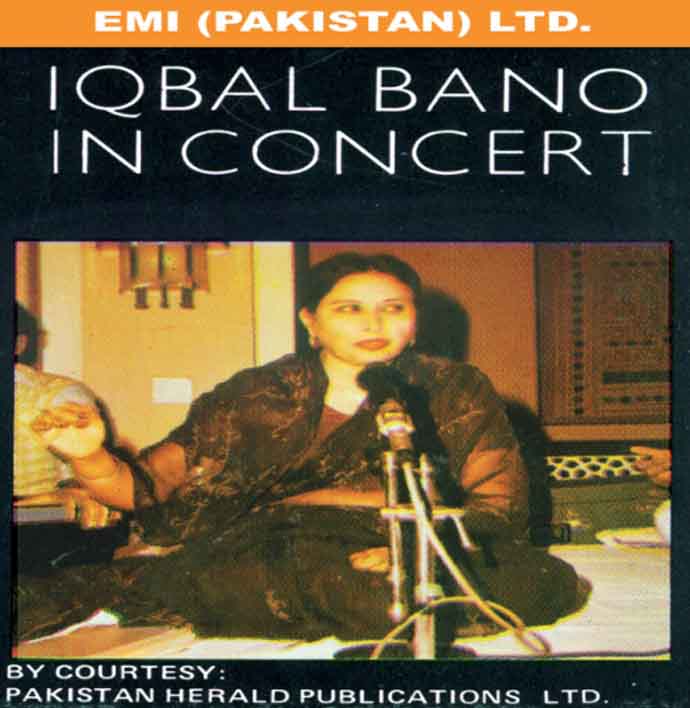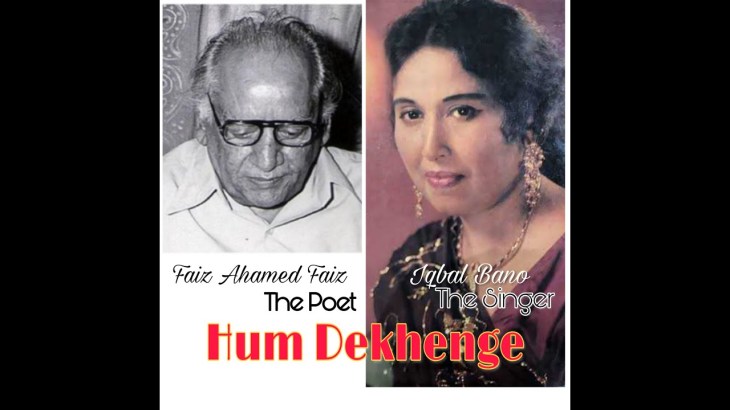
By Puja Roy
The saga of an epoch-making song…
‘Utthhega An-Al-Haq ka naara,
Jo main bhi hun
Aur tum bhi ho
Aur raaj karegi Khalak-e-khuda
Jo main bhi hun
Aur tum bhi ho’
These powerful verses conjure up many images in the mind.
The year is 1985. One can imagine a huge crowd simmering and growing in number at the other side of the white barricade with every passing second. They are growing from thirty, forty to fifty thousand and even more. Man, woman, youth, kids and the old, who isn’t there? They all have thronged to this concert at the National Stadium, Lahore. They are glued to the stage, immersed into the performance with waving heads, moving lips and hands that were rising and falling with the thrust of the words of the powerful nazm.
A lady in a black saree fraught with Multani zari work is seated on the stage, her ethereal posture has almost assumed the form of ‘Joan of Ark’.
The sheen of her zari rich saree bedazzles the stage. With one hand strongly holding the mike, the other hand is raised in the motion, feeling the throb and pulse of the maddening crowd. Her eyes, now closed mouthing some deep words, now open looking for her audience’s reaction…
Yes, the lines are strong enough for one to imagine that the surcharged audience has now broken the barricade in jest and is singing aloud in unison: ‘Hum dekhenge, hum dekhenge’.
She is Iqbal Bano.
‘Wo din ke jiska waada hai,
Hum dekhenge’…
Iqbal Bano, the renowned ghazal and thumri fankar of Pakistan isn’t here today as the shaan-o-shaukat of a ‘majlis’. She has come as the iron lady of Pakistan, as the voice of revolt and dissent against the atrocities being meted out by the General Zia-Ul-Haq government.
The government that seized power (Takhqt-e-Pakistan) and imposed the draconian Martial Law in Pakistan. The government led by General Zia that hanged Prime Minister Z.A. Bhutto, who was democratically elected by the citizens, unlawfully.
The government that is announcing ‘ajeeb-o-gareeb’ farmaan in the land almost every day and with whose aid, terror, injustice and unruliness spread across the land, where orthodox, old school thought processes are becoming the law of the land with Sharia leading the way. Liberals and secularists, poets and intellectuals are being attacked with weapons that are sharpened by the incorrect interpretation of various tenets of Islam. The government that is taking ‘na-muraad’ refuge in fundamentalism and communalism.
It is this government that Iqbal Bano has decided to stand against, as a representative of several others who are going through the same agony.
Amidst all this, the Zia government announced that wearing ‘saree’ for Pakistani women is forbidden as it is un-Islamic.
Huge furore broke out almost instantly. Protests and dissent against this ‘na-pak’ and atrocious system spread across the country. An unwritten Jihad was in the air.
To stand against this draconian law, Bano calls forth the people of Lahore.
However, in a situation where at every turn, liberals are being attacked and women are being pushed into the darkness of oppression, raising a voice against such an autocratic system is equivalent to standing in front of the firing squad. One can imagine now, what amount of ‘jigar’ or valour is required to do the same.
With so much of fear all around, her only weapon was Faiz Ahmed Faiz – Pakistan’s most powerful and controversial communist poet, who had died nearly a year ago but his fiery verses have kept the flames of dissent burning in the minds of his readers. One can imagine the humungous crowd raising slogans after the concert like ‘inquilab Zindabad’ and ‘An-al-haq’.
‘Utthega An-Al-Haq ka Naara
Jo main bhi hu aur tum bhi ho…’
An-Al-Haq means ‘I am the truth’.
Faiz wrote that a day would come when the ultimate realisation that ‘I am the truth’ (An-Al-Haq) would reign in the air. And that day, there wouldn’t be any differentiation any more, as truth is one. Truth is what I am, Truth is what you are.
Everyone is equal in front of the ultimate truth and since we are the ‘Truth’, we are all Equal.
How solemn are the words!
Truth is omnipresent and it echoes in every corner of the universe! From the depths of Upanishad emerges, ‘aham Bhrahashmi’ – which means, I am Brahma, I am the Truth.
Simultaneously, ‘Revelation’ (1:18, KJV) in Bible says, “I am he that liveth, and was dead; the truth and the lie and, behold, I am alive forevermore, Amen; and have the keys of hell and of death. I am He.”
Every single particle of the Universe comes together to know thyself and become one.
Every time we listen to these lines sung by Bano, written by Faiz, we are astonished by the wonderful co-existence of realism and philosophy at the same time. However, Faiz had completed this nazm six years before the Lahore uprising and composed its tunes himself too. The song became Pakistan’s ‘voice of dissent’ in the coming years.
Bano had faced a lot of upheaval after this concert including having to take allegations of being an Indian ‘spy’ in Pakistan as she was born in Delhi.
Her songs were banned from being played in the Pakistani Radio, her shows were all stopped, but no one could deter Bano’s invincible spirit. She performed this song throughout the world and the history that it created in the later years is for the legends.

An-Al-Haq
The first person one comes across while researching on this word is a Malayali author – Vaikam Muhammad Bashir. In his short story collection ‘Anargha Nimisham’ published in 1946, one story was called “An-Al-Haq” and the history behind the story was derived from another remarkable biography.
Abu Hussain Bin Mansoor Hallaj, more popularly known as Al-Hallaj, was a famous Sufi saint of Persia born in 858 AD in the Fars province of present-day Iran. A true seeker, Al-Hallaj was a devout Sufi, immersed completely in his search for God. Al-Hallaj had memorized the entire Quran before he was 12-years-old and would often retreat from worldly pursuits to join other mystics. Under the tutelage of the famous Sufi saint Junayd Baghdadi, his study on mysticism continued and thrived. In his first pilgrimage to Mecca, he sought divine pursuits with Mevlavi Sufis. He devoted his life in theological pursuits and dived deep into the recesses of human consciousness to know thyself and in the process, the divine. He took to silence and fasting for a year and lived in the caves. Came back and shared the knowledge of the divine with the common mass. Took 400 disciples along with him to pay his homage to the holy Kaaba in his second Mecca pilgrimage.
When Al-Hallaj went into the maddening depths of Sufi mysticism, there developed false allegations against him for practicing ‘black magic’ and other unlawful sensory practices.
This was the time when he was completely into the grips of his deep thoughts and experienced ‘self-annihilation’ (Fanaah). He was travelling extensively around Iran, Iraq, Damascus and Syria and speaking about his mystic experiences and became hugely popular. His state of divine ecstasy brought him close to divine powers and he would often be ‘possessed’ by these powers and in those very moments when he reached the peak, he would shout ‘An-Al-Haq’ ‘An-Al-Haq’ and run around like a crazy lunatic. He would shed tears at times and would burst into laughter later with just pronouncing the one constant thing: ‘An-Al-Haq’.
Overnight, a Kangaroo Court was set up by orthodox mullahs and Al-Hallaj was imprisoned. On 25 March, 922 AD, his public execution was announced to all and sundry. The next day, along the banks of Tigris, the crowd spilled over in thousands to witness his public hanging. He was brought to the execution spot, his hands and legs shackled. His followers and disciples shed copious tears, as they watched this terrible incident helplessly. However, no tinge of hatred, fear or pain was seen in Al-Hallaj’s face; a strange celestial smile lingered on his lips.
The time arrived, and the gatekeepers of the society started announcing the long list of accusations against him, detailing his innumerable ‘unlawful’ activities. Interrupting them midway, Al-Hallaj pronounced, ‘Please hurry up, HE is waiting for me.’ Everyone stood motionless, hearing this. But this angered the man appointed for executing him. He came forward and started lashing Al- Hallaj, till he fell on the ground unconscious. He was taken to the gallows and hanged. This still didn’t satiate their anger. They set him ablaze and charred his body, the ashes of which were thrown into the flowing waters of Tigris. Legends have it, as the ashes were taken away from one stream to the other by the Tigris, his disciples had pronounced in unison ‘An-Al-Haq’ ‘An-Al-Haq’ ‘An-Al-Haq’ and the words reached the skies high above and echoed in the air of Baghdad.
Later, Al-Hallj’s words ‘An-Al-Haq’ reached Turkistan, Iran, Afghanistan and India.
Picture this. The huge Tigris River is taking the ashes of the realized man, Al-Hallaj. One can imagine him, as if from a different birth, Al-Hallaj, standing in front of us, his body partly charred, his neck bearing the mark of strangulation.
Slowly, his face is vanishing into the mist of times, and there appear faces, all similar, yet different, one by one – Vaikam Muhammad Bashir, Faiz, Ahmed Faiz, Iqbal Bano. They appear and disappear, as if trying to say the same story through different faces in different times.
And one can then see, Kalburgi, Pansare, Gouri Lankesh emerge out of this mist, their faces – bearing the strong resolve and grit that their voices of dissent proclaimed ferociously throughout their lifetime. They all become one. Their faces solemn, their eyes still and their lips pronouncing the one ultimate truth – I am the truth! An-Al-Haq!
The above is a translation of the original article in Bengali by journalist and writer Prasenjit Dasgupta.
Bio:
Puja Roy has authored a book of short stories and is a published translator. She has studied Comparative Literature at Jadavpur University and has a Diploma in Film Studies. An avid reader, Puja loves to research on history, cinema, art and culture. Currently she is working on a research-based translation project around popular subcontinental music.
***
Like Cafe Dissensus on Facebook. Follow Cafe Dissensus on Twitter.
Cafe Dissensus Everyday is the blog of Cafe Dissensus magazine, based in New York City and India. All materials on the site are protected under Creative Commons License.
***
Read the latest issue of Cafe Dissensus Magazine, “Poetics and politics of the ‘everyday’: Engaging with India’s northeast”, edited by Bhumika R, IIT Jammu and Suranjana Choudhury, NEHU, India.

I am amazed by the scope of your research, dilligence and lucidity. You evoked eras and fearlessness of such supreme mortals with your words. I thank you for that.
LikeLiked by 1 person
Thank you so much for your encouraging words!
LikeLike
Cheers
LikeLike
Excellent writing and translation.What a Research work..An- Al-Haq… really came to know a lot.. Thanks to both the Writer and translator……
LikeLike